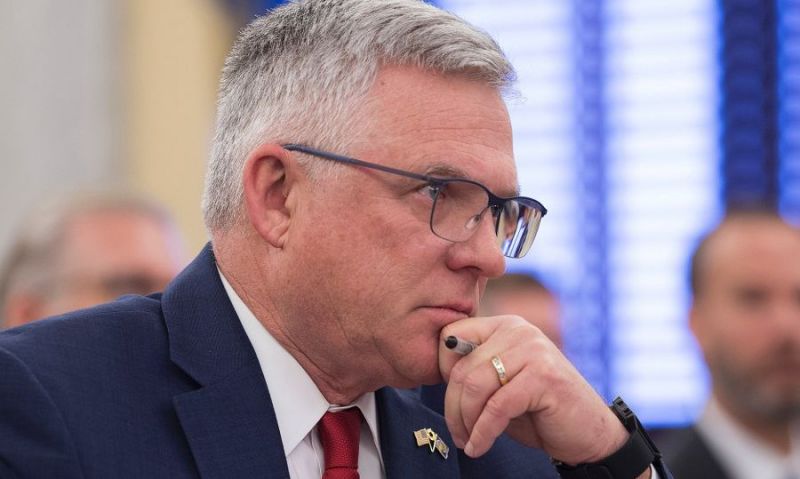
Richard Stone, executive in charge of the Veterans Health Administration, predicted difficulty Wednesday with administering coronavirus vaccines to its patients, particularly veterans in rural areas.
The leader of the Department of Veterans Affairs health care system predicted difficulty Wednesday with administering coronavirus vaccines to its patients, particularly veterans in rural areas.
Richard Stone, executive in charge of the Veterans Health Administration, testified before the Senate Veterans’ Affairs Committee about the department’s strategy for administering a coronavirus vaccine once one is available. The VA ordered 73,000 doses of the Pfizer vaccine last week and prepared 37 medical centers to receive and administer them. However, that won’t be nearly enough to reach veterans across the country, Stone said.
More than 9 million veterans are enrolled in VA health care, and the department predicts that 7 million of them could seek a vaccine from the department. The VA also employs 400,000 people, including 350,000 health care workers.
“It is not an adequate amount, and this will be a long process to reach all 7 million veterans who we believe will want a vaccine from us and 400,000 VA employees,” Stone said.
The 37 sites were chosen based on the availability of ultra-cold refrigeration. The Pfizer vaccine must be frozen at 94 degrees below zero. The VA also chose sites that treat high concentrations of VA patients.
The list of 37 locations was shared by the VA with the Centers for Disease Control and Prevention. It will likely be posted publicly this weekend, Stone said.
The department has ordered more refrigeration units, which will allow 36 more VA sites to gain the ability to administer vaccines within the next two weeks, Stone said. The department signed 87 contracts for dry ice, with the intention to use it to transport the doses to the 36 other locations.
The agency has also explored the idea of flying small amounts of doses into rural areas.
“The difficulty here is refrigeration,” he said. “We’ve looked into aircraft to go into rural areas and bring small amounts of vaccine in. I believe we’re going to need to have that kind of creativity and innovation to deliver this effectively and quickly.”
The VA won’t be able to reach all veterans with only the Pfizer vaccine, Stone predicted. The department has readied 200 sites to administer the Moderna vaccine and ordered 122,000 doses of it. The Moderna vaccine does not require ultra-low refrigeration. It’s slightly behind Pfizer in the approval process.
“I don’t think it’s going to cover the entire nation in the way it should,” Stone said of the VA’s Pfizer distribution sites. “I’m going to need the Moderna vaccine and the 200 sites I’m going to have for Moderna in order to reach the rural veteran.”
Because both vaccines require two doses in order to be effective, the VA is attempting to develop a system to track which veterans have received a vaccine and when they’re due for the second dose — something that will require a “Herculean effort,” Stone said.
Stone asked senators for more money to handle coronavirus treatment and vaccine distribution. Under the CARES Act, a coronavirus relief package approved by Congress in March, the VA health care system received $17.4 billion. It’s spent about $8 billion of that and is likely to use the rest by the end of the fiscal year, Stone said. He predicted unforeseen costs with distributing and administering coronavirus vaccines.
Stone also said the VA was likely three to four weeks away from hitting a peak of coronavirus cases among its patients. As of Wednesday, 16,239 VA patients were sick with the virus and 5,443 had died from it. Nearly 1,400 of the deaths occurred in the past month. The VA’s data does not include all veterans in the United States, nor does it include the hundreds of deaths that have occurred at state-run veterans’ homes.
In a document released Tuesday, the VA said priority for coronavirus vaccines would go to its front-line health care workers, followed by veterans at higher risk for spreading the virus or becoming severely ill from it.
Those veterans at higher risk include elderly veterans, veterans living in group living facilities — such as nursing homes or homeless shelters — and those with health problems, such as cancer, diabetes or heart disease. Black, Hispanic and Native American veterans will also be prioritized. According to VA data, minority veterans are disproportionately affected by the virus.
Members of The American Legion can receive 50 percent discounts on annual subscriptions to the Stars and Stripes digital platform of exclusive military news, topics of interest to veterans, special features, photos and other content, including the daily e-newspaper, job listings and history. American Legion members can subscribe for $19.99 a year by visiting legion.stripes.com and using the coupon code LEGIONSTRONG when filling out the online form.
- Veterans Healthcare

